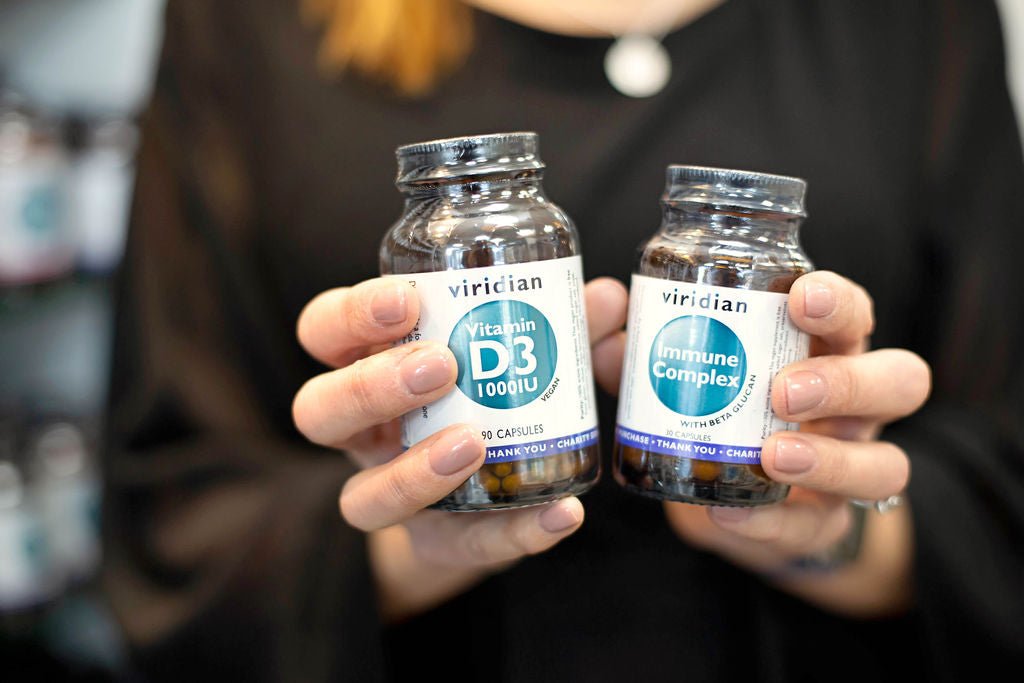The Benefits of Vitamin D

Vitamin D is essential to our health. Vitamin D is often referred to as the sunshine vitamin as we synthesise and absorb this vitamin from sunlight on the skin. Vitamin D is also available in very small amounts in eggs and oily fish but it is very difficult to get all of the vitamin D we need through food. Given that sunshine is very limited in the UK, particularly between September and April, Vitamin D supplementation is essential to get the required levels. NHS England recommend that everyone (including pregnant and breast feeding women) should take a Vitamin D supplement from the end of September to early April as the benefits of Vitamin D are many!
If you are considering Vitamin D supplements, you may well be confused – how much should you be taking and how do you choose between capsules and liquids, D2 or D3? In this blog our Nutritional Therapist Joanne Hill, explains more about the forms and dosages available to help you choose. You can also book a free one to one health review or give us a call and we can make a personalised recommendation for you.
The Benefits of Vitamin D
Before we talk about the type of Vitamin D to take, it is worth understanding more about why you need this essential vitamin.
We know that there are two main functions of Vitamin D
-
Protection of bones, teeth and muscle function. Vitamin D contributes to the normal absorption and utilisation of calcium and phosphorus and so in doing so it contributes to the normal maintenance of bones, teeth and muscle function.
- Immune Health. Vitamin contributes to the normal function of the immune system. Our immune cells contain vitamin D receptors and so a deficiency in vitamin D is associated with increased autoimmunity and an increased susceptibility to infection. Autoimmune conditions include multiple sclerosis, type 1 diabetes, psoriasis and some thyroid disorders(1)
Over recent years, more and more research has been carried out on the role of Vitamin D in health. Many studies have associated Vitamin D deficiency with certain health conditions and correcting the deficiency, has then shown improvements in the condition. Whilst these benefits do not yet have proven health claims (either more research is needed or the research needs to be reviewed before we can state that Vitamin D can help this conditions), the research is promising. Some of the conditions with a positive association to increasing vitamin D intake are :
-
Type 2 Diabetes
Numerous studies have shown Vitamin D3 to improve short and long term glycaemic control in people with type 2 diabetes, with doses ranging from 2,000–10,000 IU per day (2,3,4,5,6,7)
-
Skin Conditions.
Vitamin D is naturally made by the action of the sunlight on the skin and recent research has shown vitamin D to have beneficial effects on inflammatory skin conditions such as eczema and psoriasis. A review published in skin Pharmacology and Physiology reported that Vitamin D deficiency is associated with the risk of psoriasis and atopic dermatitis. The report concluded that Vitamin D could be an important therapeutic option for psoriasis and atopic dermatitis(8)
-
Depression and low mood.
Various studies have linked Vitamin D status to low mood and there is a thought that Vitamin D deficiency may be a contributing factor to Seasonal Affective Disorder (SAD), a form of depression, due to the low levels of sun exposure in the winter.
One particular study found blood levels of vitamin D to be significantly lower in people with depression than in healthy people.(9)) In a further study, healthy people were given 400–800 IU per day of vitamin D3, or no vitamin D3, for five days during late winter. Results showed that vitamin D3 significantly enhanced positive mood and there was some evidence of a reduction in negative mood compared to a placebo.10 Other trials have shown similar positive benefits (11,12)
How much Vitamin D should I take?
This is a big question and it is not the same answer for everyone.
The recommended daily amount (RDA) is 400IU. I would however consider this to be a low dosage. At this level of supplementation, you may be able to maintain adequate vitamin D levels, but it is unlikely to be enough to correct a deficiency or support a health concern.
It is likely that you will have a requirement for higher levels if any of the following factors apply :
- You are not currently taking a vitamin D supplement and have not done so in recent months.
- You have had little or no sun exposure in the last month or so. Adequate sun exposure requires you to be wearing shorts and a t shirt without sun block (this will block vitamin D) for around 20 minutes a day.
- You have an immune related condition such as an auto immune disease or a low immune system.
- You have darker skin colour. Darker skins produce vitamin D more slowly and so are more at risk of deficiency.
- During times of a high incidence of colds, flu and viral infections when you need optimum immune function.
- You have osteopenia or osteoporosis. With these conditions you need Vitamin D to maximise calcium absorption into bone
- You are peri menopausal or menopausal and you do not take HRT. Oestrogen has a protective role in bone health and so following menopause you need to maximise bone strength with calcium and Vitamin D.
If any of these apply, my advice is that you should be taking a supplement of at least 1,000IU. To correct a deficiency, higher dosages may be required. To give very specific dosage instructions we would advise a Vitamin D test which can be done at our clinic in Stockport or at home. It is a very simple skin prick test to measure your current vitamin D status.
A word of warning, too much can be a bad thing. Please be aware that Vitamin D is a fat soluble nutrient and so it will store in fat cells and the liver. Taking very high dosages for long periods can therefore lead to toxicity.
What Type of Vitamin D should I take?
There are a few key considerations
-
The form of Vitamin D: D2 or D3?
Until recent years, Vitamin D2 was the plant based supplement form of Vitamin D, whereas D3 is from animal products (usually sheep’s wool). More recently, however vegan D3 products have become available, including an excellent range of capsules, sprays and liquids by Viridian Nutrition. Their vegan D3 is sourced from lichen,
D3 is the form I advise for supplementation. This is the form that we get naturally from sunlight, and it has been shown to raise blood levels more effectively than D2. D2 is often a cheaper form of vitamin D and as such it is used in fortified foods such as cereals and plant milks.
-
Your preference of liquid, spray, chewable or capsule
There is some evidence that vitamin D taken as a spray, sprayed onto the cheek, can raise Vitamin D levels quicker than forms taken as a capsule or chewable. Other studies have however shown that capsules and sprays have the same efficiency.
Overall, my advice is to find the form that you are happiest to take and will take consistently. The exception to this is if you have digestive or absorption difficulties (for example, Chrons or Inflammatory bowel disease) in which go for a spray which will go straight into the blood stream via the from the mouth, avoiding the digestive system.
Types of vitamin D available are :
Spray form : Sprays are cost effective and some studies show that they do raise blood levels quicker than other forms (although some studies show that efficiency is the same). I recommended spays if you have digestion or absorption issues. My recommendations are Better You or Viridian (vegan)
Liquid form : Liquid vitamin D can be convenient and good for people who struggle with capsules. In this form Vitamin D is usually in a fat-based carrier oil which will help the absorption. Liquids can however contain added sugar or preservatives which I would advise against. My recommendations are Cytoplan or Viridian.
Capsules : Capsules are easy for many people as they can sit alongside your other daily supplements or medications. Watch out for synthetic fillers that are added to capsules. Capsules are best taken with a meal that includes some fat as this will aid absorption. Natures Plus, Viridian and TerraNova all have good options.
Chewables. Many chewable tables available have a low dosage and contain high amounts of sugar or artificial sweeteners and so generally I would not recommend these. The exception would be for children or in other cases where somebody is unwilling or unable to take the other forms. Chewables certainly better than not taking at all. Natures Plus have good chewables for adults and children.
-
Whether you would benefit from other nutrients (e.g Calcium or Vitamin K)
Vitamin D can be included in a formulation along with other nutrients. Calcium and Vitamin K are often included with Vitamin D due to their joint benefits for bone health. Other specific nutrients are helpful if you follow a specific diet or have specific requirements. The level of Vitamin D can be lower in multi vitamins so we would advise a free health review so that we can advise an appropriate product to match your needs.
References
-
Vitamin D and the immune system - PubMed (nih.gov)
- . Felicio K, de Souza A, Neto J, et al. Glycemic Variability and Insulin Needs in Patients with Type 1 Diabetes Mellitus Supplemented with Vitamin D: A Pilot Study Using Continuous Glucose Monitoring System. Curr Diabetes Rev2018;14:395–403.
- Bogdanou D, Penna-Martinez M, Filmann N, et al. T-lymphocyte and glycemic status after vitamin D treatment in type 1 diabetes: A randomized controlled trial with sequential crossover. Diabetes Metab Res Rev2017;33.
- Wierzbicka E, Szalecki M, Pludowski P, et al. Vitamin D status, body composition and glycemic control in Polish adolescents with type 1 diabetes. Minerva Endocrinol2016;41:445–55.
- Savastio S, Cadario F, Genoni G, et al. Vitamin D Deficiency and Glycemic Status in Children and Adolescents with Type 1 Diabetes Mellitus. PLoS One2016;11:e0162554.
- Hafez M, Hassan M, Musa N, et al. Vitamin D status in Egyptian children with type 1 diabetes and the role of vitamin D replacement in glycemic control. J Pediatr Endocrinol Metab2017;30:389–94.
- Aljabri K, Bokhari S, Khan M. Glycemic changes after vitamin D supplementation in patients with type 1 diabetes mellitus and vitamin D deficiency. Ann Saudi Med2010;30:454–8.
-
Umar M, Sastry KS et al. Vitamin D and the pathophysiology of inflammatory skin diseases. Skin Pharmacology and Physiology. Published online https://www.karger.com/Article/FullText/485132
- Hoogendijk WJ, Lips P, Dik MG, et al. Depression is associated with decreased 25-hydroxyvitamin D and increased parathyroid hormone levels in older adults. Arch Gen Psychiatry 2008;65:508-12.
- . Lansdowne ATG, Provost SC. Vitamin D3 enhances mood in healthy subjects during winter. Psychopharmacology1998;135:319-23.
- Arasteh K. A beneficial effect of calcium intake on mood. J Orthomolec Med1994;9:199-204.
- . Khoraminya N, Tehrani-Doost M, Jazayeri S, et al. Therapeutic effects of vitamin D as adjunctive therapy to fluoxetine in patients with major depressive disorder. Aust N Z J Psychiatry2012;Oct 23:[Epub ahead of print].
